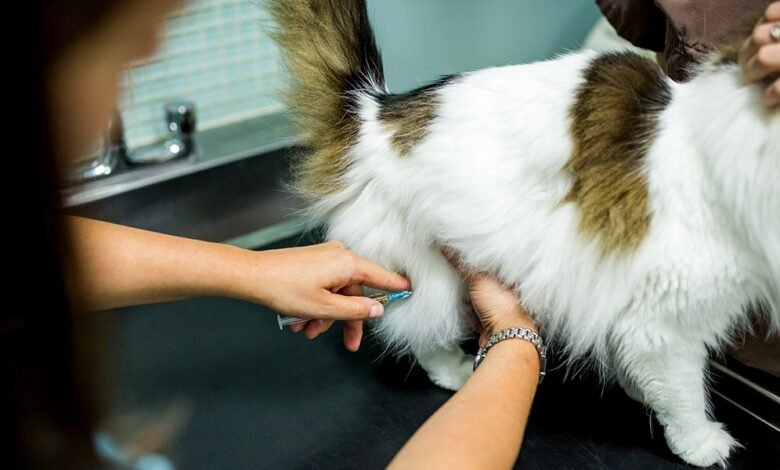
Preventative Care for Your Cat: Benefits of Vaccination
Cats are adorable creatures, and they make excellent companions. However, keeping your pet healthy and happy is essential as a cat owner. One of the best ways to do that is by providing preventative care. Vaccination is a critical component of preventive care that is often overlooked. This article will discuss the benefits of vaccination and how it can help keep your cat healthy and protected.
Introduction
You want to keep your furry friend healthy and happy as a cat owner. Preventative care is essential to achieving this goal. Vaccination is an important component of preventive care that helps protect your cat from infectious diseases. Vaccines stimulate your cat’s immune system to fight off specific viruses and bacteria, reducing the risk of infection and illness.
Understanding Vaccination
What is vaccination?

Vaccination introduces a small amount of a disease-causing microbe, or antigen, into your cat’s body. This antigen stimulates the immune system to produce an immune response, which includes the production of antibodies. These antibodies remain in your cat’s body and help fight off the disease if your cat is exposed to it in the future.
How do vaccines work?
When a vaccine is administered, it tricks your cat’s immune system into thinking it has been exposed to a disease-causing microbe. The immune system responds by producing antibodies that are specific to that microbe. These antibodies stay in your cat’s body and provide immunity if your cat is ever exposed to the disease-causing microbe again.
Different types of vaccines
There are two main types of vaccines for cats: inactivated and modified-live. Inactivated vaccines contain killed viruses or bacteria, while modified-live vaccines contain live microorganisms that have been weakened. Both types of vaccines are effective, but modified-live vaccines can provide longer-lasting immunity.
Benefits of vaccination
The benefits of vaccination are numerous. Vaccines can protect your cat from infectious diseases that can cause severe illness or death. They can also reduce the spread of contagious diseases within the feline population, which is especially important in multi-cat households or areas with high feline populations.
Read More: Best Tips For Pet Care in 2023
Common Vaccines for Cats
FVRCP vaccine
The FVRCP vaccine is a combination vaccine that protects against feline viral rhinotracheitis, calicivirus, and panleukopenia. Feline viral rhinotracheitis and calicivirus are respiratory viruses that can cause sneezing, coughing, and discharge from the eyes and nose. The FVRCP vaccine is usually given as a series of shots during kittenhood, with booster shots recommended every 1-3 years.
Rabies vaccine
The rabies vaccine is required by law in most states, as rabies is a serious and deadly disease that can be transmitted to humans. The vaccine is usually given as a single shot, with booster shots recommended every 1-3 years.
Feline leukemia vaccine
The feline leukemia vaccine is recommended for all cats, especially those that go outdoors or live with other cats. Feline leukemia is a viral disease that can cause anemia, cancer, and immune system suppression. The vaccine is usually given as a series of shots during kittenhood, with booster shots recommended every 1-3 years.
Chlamydia vaccine
The chlamydia vaccine is recommended for cats at risk of contracting chlamydia, a bacterial infection that can cause conjunctivitis and respiratory problems. The vaccine is usually given as a series of shots during kittenhood, with booster shots recommended every 1-3 years.
Vaccination Schedule for Cats
When to vaccinate kittens
Kittens should be vaccinated starting at 6-8 weeks, with booster shots given every 2-4 weeks until they are 16 weeks old. This ensures they are protected against common feline diseases during their early development.
Vaccination schedule for adult cats
Adult cats should receive booster shots every 1-3 years, depending on the vaccine and the cat’s health and lifestyle. Your veterinarian can recommend a vaccination schedule tailored to your cat’s needs.
Importance of booster shots
Booster shots are important because they help ensure your cat’s immunity to common feline diseases. Without booster shots, your cat’s immunity can weaken, leaving them vulnerable to infection and illness.
Risks and Side Effects of Vaccination
Common side effects
Common side effects of vaccination include mild fever, lethargy, and reduced appetite. These side effects usually resolve within a few days and are not cause for concern.
Rare risks and side effects
Rare risks and side effects of vaccination include allergic reactions, anaphylaxis, and injection site reactions. These side effects are uncommon but can be severe. If you notice any unusual symptoms after your cat receives a vaccine, contact your veterinarian immediately.
How to minimize risks and side effects
You can minimize vaccination risks and side effects by working closely with your veterinarian. Your veterinarian can recommend a vaccine schedule appropriate for your cat’s health and lifestyle. They can also monitor your cat for unusual reactions and provide necessary treatment.
Read More: Why Cats Make Good Companions
Some Imp FAQs
- Can vaccination prevent all diseases in cats? Vaccination cannot prevent all cat diseases, but it can protect against many common feline diseases.
- Is vaccination necessary for indoor cats? Vaccination is still required for indoor cats, as they can still be exposed to diseases through contact with humans, other pets, or contaminated objects.
- How often should my cat be vaccinated? Your cat should receive booster shots every 1-3 years, depending on the vaccine and their health and lifestyle.
- What should I do if my cat reacts to a vaccine? If you notice any unusual symptoms after your cat receives a vaccine,
Conclusion
Vaccination is a critical component of preventative care for cats. It can protect your cat from infectious diseases and ensure they remain healthy and happy. By working closely with your veterinarian, you can develop a vaccine schedule tailored to your cat’s needs and lifestyle.
Vaccination is a crucial aspect of preventative care for cats. It helps protect them from infectious diseases that can cause severe illness or even death. Following a recommended vaccine schedule and working closely with your veterinarian can ensure that your cat remains healthy and happy. While vaccines have potential risks and side effects, the benefits outweigh the risks. Vaccination is a simple and effective way to keep your feline friend safe and healthy, and it is an essential responsibility of pet ownership.







